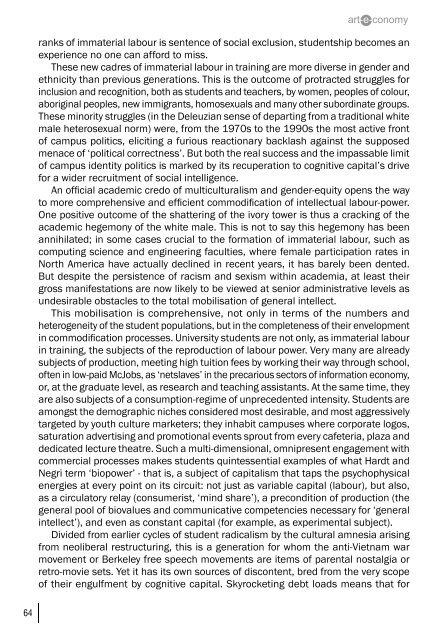art-e-conomy _ reader - marko stamenkovic
art-e-conomy _ reader - marko stamenkovic
art-e-conomy _ reader - marko stamenkovic
You also want an ePaper? Increase the reach of your titles
YUMPU automatically turns print PDFs into web optimized ePapers that Google loves.
64<br />
ranks of immaterial labour is sentence of social exclusion, studentship becomes an<br />
experience no one can afford to miss.<br />
These new cadres of immaterial labour in training are more diverse in gender and<br />
ethnicity than previous generations. This is the outcome of protracted struggles for<br />
inclusion and recognition, both as students and teachers, by women, peoples of colour,<br />
aboriginal peoples, new immigrants, homosexuals and many other subordinate groups.<br />
These minority struggles (in the Deleuzian sense of dep<strong>art</strong>ing from a traditional white<br />
male heterosexual norm) were, from the 1970s to the 1990s the most active front<br />
of campus politics, eliciting a furious reactionary backlash against the supposed<br />
menace of ‘political correctness’. But both the real success and the impassable limit<br />
of campus identity politics is marked by its recuperation to cognitive capital’s drive<br />
for a wider recruitment of social intelligence.<br />
An official academic credo of multiculturalism and gender-equity opens the way<br />
to more comprehensive and efficient commodification of intellectual labour-power.<br />
One positive outcome of the shattering of the ivory tower is thus a cracking of the<br />
academic hegemony of the white male. This is not to say this hegemony has been<br />
annihilated; in some cases crucial to the formation of immaterial labour, such as<br />
computing science and engineering faculties, where female p<strong>art</strong>icipation rates in<br />
North America have actually declined in recent years, it has barely been dented.<br />
But despite the persistence of racism and sexism within academia, at least their<br />
gross manifestations are now likely to be viewed at senior administrative levels as<br />
undesirable obstacles to the total mobilisation of general intellect.<br />
This mobilisation is comprehensive, not only in terms of the numbers and<br />
heterogeneity of the student populations, but in the completeness of their envelopment<br />
in commodification processes. University students are not only, as immaterial labour<br />
in training, the subjects of the reproduction of labour power. Very many are already<br />
subjects of production, meeting high tuition fees by working their way through school,<br />
often in low-paid McJobs, as ‘netslaves’ in the precarious sectors of information e<strong>conomy</strong>,<br />
or, at the graduate level, as research and teaching assistants. At the same time, they<br />
are also subjects of a consumption-regime of unprecedented intensity. Students are<br />
amongst the demographic niches considered most desirable, and most aggressively<br />
targeted by youth culture marketers; they inhabit campuses where corporate logos,<br />
saturation advertising and promotional events sprout from every cafeteria, plaza and<br />
dedicated lecture theatre. Such a multi-dimensional, omnipresent engagement with<br />
commercial processes makes students quintessential examples of what Hardt and<br />
Negri term ‘biopower’ - that is, a subject of capitalism that taps the psychophysical<br />
energies at every point on its circuit: not just as variable capital (labour), but also,<br />
as a circulatory relay (consumerist, ‘mind share’), a precondition of production (the<br />
general pool of biovalues and communicative competencies necessary for ‘general<br />
intellect’), and even as constant capital (for example, as experimental subject).<br />
Divided from earlier cycles of student radicalism by the cultural amnesia arising<br />
from neoliberal restructuring, this is a generation for whom the anti-Vietnam war<br />
movement or Berkeley free speech movements are items of parental nostalgia or<br />
retro-movie sets. Yet it has its own sources of discontent, bred from the very scope<br />
of their engulfment by cognitive capital. Skyrocketing debt loads means that for


